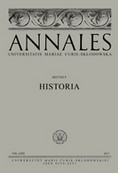Struktura dóbr szlacheckich w księstwie głogowskim i podstawy ich prawnego funkcjonowania w czasach habsburskich (1526–1740)
Structure of Noble Goods in the Principality of Głogów and the Legal Basis for Their Functioning during the Habsburg Times (1526–1740)
Author(s): Jarosław KuczerSubject(s): Political history, Social history, Culture and social structure , 16th Century, 17th Century, 18th Century
Published by: Wydawnictwo Naukowe Uniwersytetu Marii Curie-Sklodowskiej
Keywords: Silesia; nobility; landed property; principality of Głogów; fideicommission;
Summary/Abstract: The article discusses the problem of land ownership in the hands of the nobility in the Habsburg period in the Duchy of Głogów, which remained a separate administrative part of the then Czech rule. The issues were mainly connected with the population potential of the principality and with its territory, on the basis of which the development of small, medium and large landed property was analyzed. The noble property of the Głogów principality was entrusted in possession on the basis of three legal orders. The main division was on the line of unconditional inheritance, feudal heredity and transitory form. At the root of such diversity was the complicated history of the Duchy of Głogów in the middle and late Middle Ages, and thus its belonging to the Czech Crown, the rule of the Głogów Piasts, and then entrusting it to the members of the Polish-Lithuanian Jagiellonian Dynasty (Jan Olbracht and Zygmunt Jagiellończyk, Władysław Jagiellończyk and Ludwik II). The discussed diversity in terms of the size of assets and their legal position vis-à-vis the King of the Czech Republic was associated with the occurrence of such forms as powers, fideicommissions, majorates and a free state. The owners of each of them had different land rights, and their estates – along with raising their rank – could even become separate administrative units whose owners could acquire princely rights (including, for example, a separate position in public life by obtaining a vote during the Silesian parliament).
Journal: Annales Universitatis Mariae Curie-Skłodowska, sectio F – Historia
- Issue Year: 74/2019
- Issue No: 1
- Page Range: 159-182
- Page Count: 24
- Language: Polish

